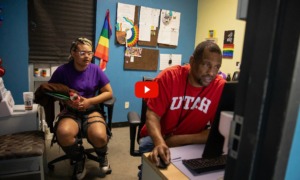Front-Line Youth Workers
Lorenzo D. Harrison, Administrator
Office of Youth Services
U.S. Department of Labor
Washington, DC
Thanks for the honorable mention in your editorial [October] on front-line youth workers concerning the apprenticeship program we’ve championed at the Department of Labor. It’s difficult to overstate how much I’ve been pushing the idea of building the capacity of communities by investing in improving the skills, knowledge and commitment of front-line youth workers. I arrive at this conviction by way of my experience on the ground as a practitioner.
You should be aware of the National Youth Development Practitioners’ Institute, being run by the National Center for Strategic Non-Profit Planning and Community Leadership. In setting up the institute, we leveraged several million dollars from the Ford, C.S. Mott and Rockefeller foundations to form a public-private partnership aimed at bolstering community youth development workers and emerging workforce development leaders. We still have a lot of work to do, but it’s coming along.
Mentoring Woes
Malcolm C. Young, Executive Director
The Sentencing Project
Washington, DC
Thanks for a fine and timely editorial on mentoring in the November Youth Today. Any person interested in improving the prospects for children, particularly those with financial or other disadvantages, must be sick about the gap between the rhetoric and the financial and structural support for mentoring programs. Unfortunately, it appears far easier for politicians to promise to make a commitment to mentoring than it is for them to fulfill that promise.
Daniel F. Bassill, President
Cabrini Connections
Tutor/Mentor Connection
Chicago, IL
For more than nine years I’ve been leading an effort in Chicago that creates ongoing public awareness and is designed to draw volunteers and dollars directly into tutor/mentor programs in the city. We use computer-generated maps to show where programs are most needed, and where existing programs are located. All are linked through a website (www.tutormentorconnection.org) so that volunteers or donors who want to help mentoring in Chicago can pick a place and a program, or they can learn how to form new programs to fill voids.
We need to unite across cities and within cities. We cannot wait for national leaders to deliver the help we need. Unless tutor/mentor network leaders in multiple cities and in individual programs learn to work together and to take the lead on this mobilization of volunteers and dollars, most of us will never be as successful as we want in reaching and helping youth who would benefit from mentoring and tutoring programs.
The work at the national level is good. It is just not focused enough on moving resources down to the neighborhood level where money, technology, business partners and volunteers are most needed. There are great programs all over the country that can be models for this movement.
SCHIP: No Accountability
Joy Midman, Executive Director
National Association
for Children’s Behavioral Health
Washington, DC
I am writing to thank Andrew Beadle for his excellent coverage of the Bush administration’s diversion of SCHIP funds from the statutory target of low-income children to childless adults [“Bush Chips Away at Youth Health Insurance”]. In addition to disagreeing with HHS Secretary Tommy Thompson’s assertion that covering childless adults does not threaten children’s coverage, we are astounded at HHS’s response to the GAO’s criticism of the practice.
NACBH has been and continues to be concerned with the lack of public process through which Health Insurance Flexibility and Accountability waiver requests are submitted to and approved by HHS. If the taxpayers who fund the SCHIP and Medicaid programs, the intended beneficiaries and the providers who serve them were able to discover the states’ proposals before submission, HHS might not have the opportunity to grant quite so much “flexibility.” Where is the accountability in this process?
Service Learning Resource
Sarah S. Pearson, Program Associate
American Youth Policy Forum
Washington, DC
While November’s front-page article by Jim Myers [“Service-Learning Sits in School”] was timely and important, it overlooked a useful publication released this past summer that speaks directly to the issues mentioned. Finding Common Ground: Service-Learning and Education Reform – A Survey of 28 Leading School Reform Models highlights areas of high compatibility among leading comprehensive school reform programs such as Success for All, Coalition of Essential Schools, Micro Society and Modern Red Schoolhouse. The publication may be accessed online at www.aypf.org/pubs.htm.
Feedback
Youth Today welcomes comments by mail or e-mail. All letters must include the author’s name, job description or other connection to the youth work field, and phone number or e-mail address. Please send to: Letters to Editor, Youth Today, 1200 17th St. NW, 4th Fl., Washington, DC 20036 or info@youthtoday.org.




























